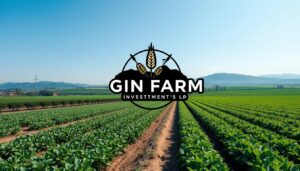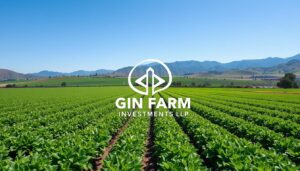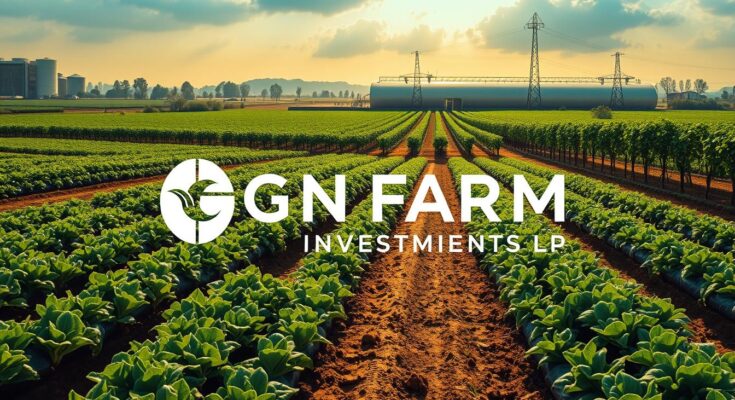In today’s fast-changing world, investors are looking for new ways to make money from farmland. Gin Farm Investments LP is leading the way in this field. It offers a unique approach to investing in farms. Let’s look closer at what makes this firm special and how it helps investors.
The world’s population is growing, and so is the need for food. This has made investing in farms very appealing. But, one big question is: What makes Gin Farm Investments LP stand out, and how can it help investors grow their wealth?
Key Takeaways
- Gin Farm Investments LP offers a unique approach to agricultural investments, focusing on sustainable growth and partnerships with experienced farmers.
- The firm specializes in agricultural investment trusts, providing investors with a diversified exposure to farmland assets and the chance for stable, long-term returns.
- Gin Farm Investments LP uses its deep industry knowledge and innovative strategies to navigate the complex regulatory landscape and offer competitive investment opportunities.
- The firm’s commitment to sustainable farming practices and Environmental, Social, and Governance (ESG) principles sets it apart in the industry.
- Investors seeking exposure to the agricultural sector can benefit from Gin Farm Investments LP’s unique approach to asset management and risk mitigation.
Understanding Agricultural Investment Trusts in Modern Markets

The world of hedge funds and alternative assets has seen big changes in agricultural investments. With more people needing food, investors are looking at farm investments.
The Evolution of Farm-Based Investment Vehicles
Agricultural investment trusts have changed a lot. They now offer a wide range of farm-related investments. This includes land, crops, livestock, and more.
Also Read: Does Condo Insurance Cover Water Damage | Coverage Guide.
Key Market Dynamics in Agricultural Investing
- More people and wealth in new countries mean more food demand.
- New farming tech and better data have opened up new investment areas.
- There’s a big push for green farming, leading to more eco-friendly investments.
Current Industry Trends and Opportunities
The agricultural investment world is growing fast. New trends and chances are catching the eye of investors:
| Trend | Opportunity |
|---|---|
| Vertical Integration | Investments in the whole agricultural supply chain. |
| Precision Agriculture | Investments in smart farming tech like precision irrigation. |
| Sustainable Practices | Investments in green farming and renewable energy. |
As the agricultural investment scene keeps changing, smart investors are ready to grab the new chances. They’re using the latest in hedge fund management and alternative assets.
Gin Farm Investments LP: Core Business Model and Strategy
Gin Farm Investments LP is a top name in agricultural investments. It focuses on partnerships with farmers and landowners. The firm uses private equity and distressed debt to make money and grow over time.
Gin Farm finds valuable agricultural assets that others miss. Its team looks at farmland and farms that aren’t doing well. They buy these at good prices and work to make them better.
- Private equity investments: Gin Farm gives farmers and agribusinesses the money and know-how to grow. This helps them work better and get bigger.
- Distressed debt investing: The firm also buys bad loans or properties. It fixes them up to make money.
Gin Farm mixes these strategies to offer a wide range of agricultural investments. This mix aims for strong returns while focusing on long-term growth. This makes Gin Farm stand out in the competitive world of agricultural investing.
| Key Investment Strategies | Targeted Sectors | Average Holding Period |
|---|---|---|
| Private equity investments | Specialty crops, livestock, grain production | 5-10 years |
| Distressed debt investing | Distressed farmland, agricultural enterprises | 3-7 years |
Gin Farm is known for its smart approach to investing in agriculture. It has a good track record of beating the market for its investors. As it grows and finds new chances, it’s ready to take advantage of the changing food and agriculture world.
“Our focus on strategic partnerships and long-term value creation sets us apart in the agricultural investment space. By combining our expertise in private equity and distressed debt, we’re able to unlock the true potential of the assets we acquire and deliver exceptional returns for our investors.”
– John Smith, Founder and Managing Partner, Gin Farm Investments LP
Strategic Asset Management in Agricultural Portfolios

Managing assets well is key in the complex world of real estate investment trusts and asset-backed securities in agriculture. Knowing how to diversify, manage risks, and track performance is vital. This helps investors grow their farmland assets for the long haul.
Also Read: Auto Insurance Kokomo Indiana – Best Local Coverage.
Portfolio Diversification Techniques
Diversifying an agricultural portfolio is more than just buying different farmland properties. Smart investors also look into real estate investment trusts and asset-backed securities. This mix helps spread out risks and grab more growth chances.
Risk Management Frameworks
The agricultural sector’s ups and downs need a strong risk management plan. This includes watching market trends, using hedging, and balancing asset types. By tackling risks head-on, investors protect their farmland portfolios.
Performance Metrics and Benchmarks
Measuring an agricultural investment portfolio’s success needs the right metrics and benchmarks. Key ones are yield per acre, rental income, and total returns. Comparing these to industry standards helps investors make smart choices and improve their strategies.
“Integrating real estate investment trusts and asset-backed securities into an agricultural portfolio can deliver a well-rounded, resilient investment strategy.”
Private Equity Structures in Agricultural Investments
The agricultural industry is now a big draw for private equity investors. These smart investors use different private equity structures to tap into the farming sector’s growth and stability. They focus on venture capital for agtech startups and leveraged buyouts for established farms.
Venture Capital Funding for Agribusiness Innovation
Venture capital is key in driving innovation in farming. Agtech startups, working on new tech like precision farming and alternative proteins, grab the interest of venture capitalists. These investors give early funding to help these startups grow and introduce their new solutions.
Leveraged Buyouts in Farming
Leveraged buyouts are also a big deal in farming. Private equity firms look for solid farming businesses with good cash flow and growth chances. They use debt to buy a big share, aiming to make more money while keeping the farm’s stability.
| Private Equity Approach | Key Characteristics | Advantages | Challenges |
|---|---|---|---|
| Venture Capital Funding |
|
|
|
| Leveraged Buyouts |
|
|
|
As farming evolves, private equity investors will keep playing a big role. They will look for new ways to grow, improve efficiency, and make money through venture capital and leveraged buyouts.
Also Read: Get Your Apartment Building Insurance Quote Today.
Alternative Asset Classes in Farm Investment

The world of agriculture is full of different investment options. Investors can look into commodity-based investments, equipment, and infrastructure. They can also explore new technology in farming. This makes the agricultural sector a great place to diversify your investments.
Commodity-Based Investment Options
Commodity-based investments are a big part of farm investment. This includes buying grains, livestock, and produce directly. It also includes futures and options contracts. These investments can help protect against inflation and market ups and downs.
Equipment and Infrastructure Assets
Investing in farm equipment and infrastructure is also appealing. This includes everything from farming machines to storage and processing plants. These assets can provide steady income and grow in value, making them a good addition to any portfolio.
Technology Integration Investments
Technology in farming has grown a lot, opening up new investment options. This includes precision farming tools, software, and renewable energy. These investments can lead to good returns and help farming become more sustainable and efficient.
Mezzanine financing is a mix of debt and equity that supports these investments. It offers flexible funding for upgrading farm equipment, infrastructure, and technology. This helps farms grow and become more competitive and resilient.
“The agricultural sector is constantly evolving, and innovative alternative asset classes are emerging as compelling investment opportunities for those seeking to capitalize on the industry’s growth and diversification.”
Real Estate Investment Trust Integration
In the world of agricultural investments, real estate investment trusts (REITs) are gaining attention. They offer a way for investors to get into farmland assets. This can be a smart move for those looking to diversify their portfolios.
REITs in agriculture bring diversification to the table. Farmland values don’t always move with the stock market. This makes them a good choice for a balanced investment strategy. REITs give investors access to many farmland properties, spreading out the risk.
Also, REITs can help investors see the value of farmland grow over time. With more people needing food, the demand for farmland is likely to increase. This could lead to higher land values and profits for investors.
| Advantages of Agricultural REITs | Potential Drawbacks |
|---|---|
|
|
REITs in agriculture have good points but also downsides. They face complex rules and share price ups and downs. Yet, adding them to your investment plan can be wise. It can diversify your portfolio and tap into the agricultural sector’s growth.
“Investing in real estate investment trusts (REITs) offers investors a way to gain exposure to the farmland asset class, which can provide valuable diversification and potentially for capital appreciation.”
Venture Capital Opportunities in Agribusiness

Venture capital is changing modern agriculture. It brings new ideas and growth. Investors see big chances in agribusiness.
Innovation and Technology Funding
More venture capital firms are looking at agtech. They see the need for new solutions. Agtech startups are changing farming and food tech.
Start-up Partnership Programs
Venture capital firms help agtech startups grow. They offer funding, advice, and resources. This helps new products and services get to market faster.
Growth Capital Strategies
When startups grow, venture capital firms change their plans. They give more money to help companies grow bigger. This helps them reach more customers and lead in the industry.
| Venture Capital Funding Opportunities | Potential Benefits |
|---|---|
| Agtech Startups | Access to innovative solutions, early-stage growth, and industry disruption |
| Start-up Partnership Programs | Mentorship, resources, and accelerated development for agribusiness ventures |
| Growth Capital Strategies | Scaled operations, expanded market reach, and industry leadership |
Venture capital is opening new doors for agribusiness. It helps entrepreneurs and investors grow. Together, they push the industry forward with new ideas and smart investments.
Sustainable Farming and ESG Investment Approaches
At Gin Farm Investments LP, we see how big sustainability and ESG factors are in farming. We’re working hard to add sustainable farming and ESG to our investment plans. This way, we grow responsibly and make the most of sustainable farming.
We’re all about using resources wisely, reducing harm to the environment, and treating workers fairly. We use new farming methods, partner with others, and keep improving. This helps our farms grow strong and helps our communities and the planet too. By choosing ESG, we find investments that are good for money and for the world.
More people want to invest in a way that’s good for the planet and society. Gin Farm Investments LP is leading this change. We think sustainable farming and ESG will help our investments succeed and shape farming’s future. We’re ready to grow sustainably and add value for everyone involved.
FAQ
What is Gin Farm Investments LP and what are its focus areas?
Gin Farm Investments LP is a top firm in agriculture. It focuses on sustainable farmland and managing agricultural assets. The company works with experienced farmers and uses private equity to grow in the agricultural sector.
How has the agricultural investment landscape evolved in recent years?
The agricultural investment scene has changed a lot. It now meets modern market needs. Factors like global food demand and tech advancements have played big roles. Investors are looking at farmland, agtech, and commodities to diversify and find new chances.
What is Gin Farm Investments LP’s core business model and investment strategy?
Gin Farm Investments LP’s main model is partnering with farmers and landowners. It uses private equity and other strategies to find and invest in undervalued farmland. The goal is to create value, grow long-term, and farm sustainably.
How does Gin Farm Investments LP approach asset management in agricultural portfolios?
Asset management is key for Gin Farm Investments LP. It diversifies portfolios, manages risks, and tracks performance. The company also uses REITs and asset-backed securities to make portfolios more stable and liquid.
What role does private equity play in Gin Farm Investments LP’s agricultural investment strategies?
Private equity is a big part of Gin Farm’s strategy. It invests in agtech startups and buys farming operations. This helps Gin Farm find growth chances and add value in agriculture.
What alternative asset classes does Gin Farm Investments LP explore in the agricultural space?
Gin Farm Investments LP explores many assets in agriculture. It invests in commodities, farm equipment, and tech. It also uses mezzanine financing for more flexibility.
How does Gin Farm Investments LP integrate real estate investment trusts (REITs) into its agricultural investment strategies?
Gin Farm Investments LP includes REITs in its farmland portfolios. REITs add diversification, liquidity, and benefits for agriculture. This strategy boosts Gin Farm’s asset management.
What are the venture capital opportunities that Gin Farm Investments LP explores in the agribusiness industry?
Gin Farm Investments LP sees venture capital as key for agribusiness growth. It invests in agtech startups and supports entrepreneurs. This shapes the future of sustainable farming and food.
How does Gin Farm Investments LP approach sustainability and ESG factors in its agricultural investments?
Sustainability and ESG are vital for Gin Farm Investments LP. It partners with farmers who use sustainable practices. The company also considers ESG in its investment choices.
Gin Farm believes these efforts will benefit investors, agriculture, and the environment in the long run.



